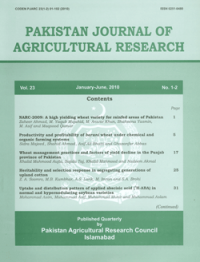Rahmat Ullah Khan, Abdur Rashid*, Mohammad Sohail Khan** and Erdogan Ozturk***
ABSTRACT
The high cost of inorganic fertilizer, use of natural fertilizer resources for increasing crop production on sustainable basis has become imperative. Two field experiments were conducted to study the potential of humic acid (HA) as a low-cost natural fertilizer and to determine its effect on the yield of rainfed wheat crop (Triticum aestivum L. cv. Naseer) at the research farm of Arid Zone Research Institute, Dera Ismail Khan during two successive winter seasons, 2007-08 and 2008-09. The treatments consisted of HA alone (3 kg ha-1 or 1.5 kg ha-1) and in combination with full (60:40 kg ha-1) and half (30:20 kg ha-1) the recommended rates of NP fertilizers. Results showed that in the first growing season (2007-08), the combination of 3 kg ha-1 HA with half (30:20 kg ha-1) rate of NP produced the highest grain yield (1314 kg ha-1) and increased the yield by 46.9% over the control. In the second growing season (2008-09), application of 3 kg ha-1 HA alone produced significantly (P<0.05) higher grain yield (2999.9 kg ha-1) and increased the yield by 24% over the control and saved 100% cost of the chemical fertilizer. Results suggested that HA applied alone at 3 kg ha-1 or in combination with half (30:20 kg ha-1) rate of NP fertilizers appeared to be the most economical rate to obtain the maximum yield of wheat under the rainfed conditions of Dera Ismail Khan. HA has great potential as a low cost natural fertilizer to improve soil fertility on sustainable basis.
To share on other social networks, click on any share button. What are these?







